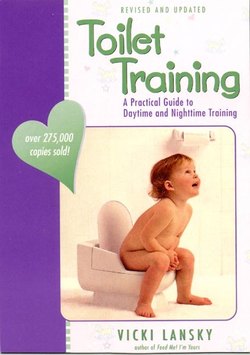Читать книгу Toilet Training - Vicki Lansky - Страница 6
На сайте Литреса книга снята с продажи.
ОглавлениеChapter 1
When Is My Child Ready to Be Toilet Trained?
The days of hand-hemmed, hand-washed, line-dried diapers are gone—thank goodness. So that should signal an era of more relaxed, less anxious parents, right?
Wrong!
The prospect of toilet training today evokes as much concern as it ever did. The pressures of friends and relatives—even doctors—as well as practical considerations have pushed many parents into premature toilet-training attempts that eventually ended in failure and frustration.
It is true that current wisdom has made many parents less intense about having a child trained before the age of two. Early training is no longer the norm, but once a parent decides that the time has come, relaxation seems to go out the window.
The simple fact is that your child must be physically and emotionally mature enough to understand and to control what is happening in the process. If you begin to toilet train a child before this point, the odds are that it simply won’t work. A child who is “trained” before age two usually has a toilet trained parent—one who is trained to catch the child!
Physical maturation first becomes possible with voluntary control over the sphincter muscles—which means being able to open and close very specific internal muscles. While this is possible by about one and a half years, this voluntary control only truly begins when a child can distinguish the sensations that precede a bowel movement or urination. This, in turn, depends on a certain amount of maturity of the central nervous system, over which no one has control.
You don’t toilet train children—you wait for their bodies to mature (a fact God has already worked out). I made a game of it, with a timer set for 15 minutes after drinking a liquid. My son loved it.
Linda Hurstell, Vicksburg, MS
Emotional readiness is also crucial. A child’s sense of self starts to emerge around the age of two. For the first time, the child realizes that he or she can affect the world and his or her own life. Unfortunately, one of the first manifestations of this new found power occurs during the “terrible twos” stage when a child seems interested only in affecting his or her world negatively! It’s not all bad, though.
One of the positive results of this emerging assertiveness is a desire to grow up. And one of the best examples of grown-up behavior a child can relate to is being toilet trained. Once your child arrives at this point, he or she is more likely to cooperate with your toilet training efforts because he or she wants to. Body mastery is more self-rewarding than a desire to please.
The average child cannot be successfully toilet trained before the age of about 28 months. While girls are often trained by two, boys may not be trained before three or later.
A report in the Journal of Ambulatory Pediatrics (2001) showed that the average age of completing toilet training—35 months for girls and 39 months for boys—are the oldest ages yet reported and in line with the trend of the increasing age for toilet training.
These results of a Practical Parenting™ Newsletter survey (1984) are similar to a 2001 study by the Medical College of Wisconsin conducted by Timothy R. Schumm, M.D.
But of course the exception to prove this rule will inevitably be your neighbor’s child, a child in your child’s play group, or your sister-in-law’s child.
Whether a child is placed on a potty seat at six weeks, six months, or 16 months, most children will not be reliable until after the age of two.
And no two children, even siblings who have been treated in exactly the same way, will be ready at the same age. There is a right time to begin this process, but it varies from child to child. Any time before the age of four is normal, despite what Grandma—or anyone else—says. 98% of kids are trained by age four.
You might wish to consider the advantages and disadvantages of early toilet training before making a decision to try it. By early, I mean from age one to age two.
Just as we were finished toilet training our son, our next child (a girl) started wanting to use the toilet. She would watch her brother sit on the toilet and cry to take her diaper off. I fought her for three weeks, refusing to potty train two at once. But finally I thought if she was that insistent, she was ready. I put her in training pants, and three weeks later (at 18 months) she was completely trained.
Charlotte Martin, Bartlesville, OK
